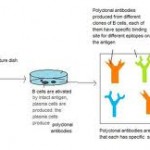The production of polyclonal antibodies
Gentaur institute offers a service that is the production of polyclonal antibodies. The client provides the immunogen and Gentaur does the rest.
The host animal
Gentaur uses rabbit breed New Zealand as a receiver.
The protocol
Gentaur uses a protocol comprising 3 month 4-5 3-4 injections and blood samples. At the end of three months, all the blood is collected. However rabbits can be maintained by immunizations and additional levies according to the clients’ project.
The antisera already produced
To date, the following antisera were produced by Gentaur:
· Anti-human prealbumin
· Anti-9GST BL21
· Anti-Tb Pex4
· Anti-Pex14
· Anti-P67
Polyclonal antibodies, an antibody secreted by B cell lines of different body. These are a collection of an immunoglobulin molecule that reacts to identify epitopes have different and specific antigen. These antibodies are prepared by inoculating normal mice, the appropriate mammal such as a rabbit or goat. The often preferred the larger amount of serum can be collected is large, in mammals. The antigen, I was injected into the mammal. This results in B lymphocytes to produce immunoglobulins IgG antibodies specific for the antigen. I was purified from the serum of a mammal this polyclonal IgG.
Meanwhile, the monoclonal antibody is obtained from cell lines. Many methods exist for the polyclonal antibodies in laboratory animals. Guidelines and procedures for animal use institutional that are associated with these methods (to direct effects of any given by myself, during several agents that modify the effect of other drugs) For the adjuvant, is used in sympathy in general, are oriented around the appropriate action. Adjuvant administration selected, the number of sites per animal and site and route, site of injection volume includes this. Typically, in order to prevent injury to the animals and staff, Institutional policy is included, the level of safety precautions and blood collection, including the anesthesia or sedation and appropriate safety of animal.
The main purpose of the production of antibodies in experimental animals is to obtain high titer for use in experimental, high-affinity antisera or diagnostic test. Adjuvants are used to enhance or improve the immune response to an antigen. Adjuvant, it is likely to provide the injection site to the antigen depot enables the sustained release of antigen in the regional lymph nodes.
Delivery relative protein antigen size, and cohesion can affect the quality and quantity of antibodies produced dramatically. Non-protein antigens and common (<10 °) small peptides, should be attached or linked to an immunogenic carrier protein, large in order to increase immunogenicity and provide T cell epitopes. In general, the immunogenic protein large-scale, better. However, the antigen-presenting cells, a large protein, which provides a better grip of the antigen processing of sufficient immune response typically in small amounts. The injection water-soluble, non-protein aggregates, the possibility of tolerance, to induce antibodies that answer go no satisfaction will be higher.
Carrier proteins of two bovine serum albumin and hemocyanin (KLH), commonly used. Further poly-L-lysine, and was successfully used as the basis of the peptide. To reduce or eliminate the use of poly-L-lysine, the production of antibodies against the foreign protein, may lead to failure of antibody production induced by the peptide. Recently, also liposomes are used for delivery of small peptides successfully, this technique has some alternative means for supplying oil emulsion additives.

